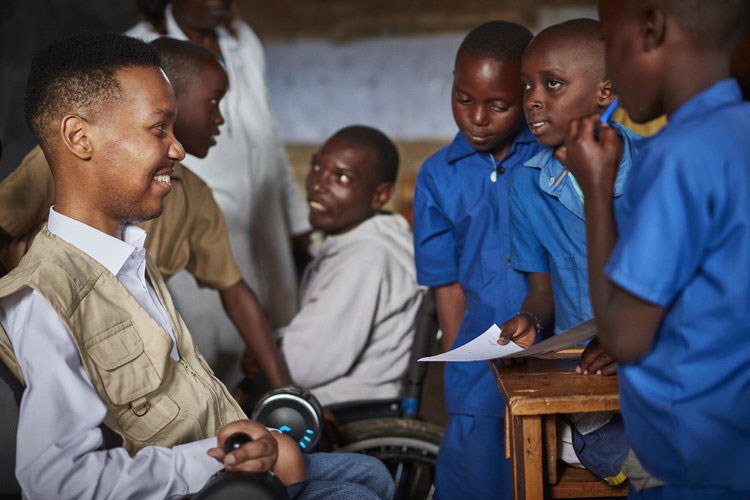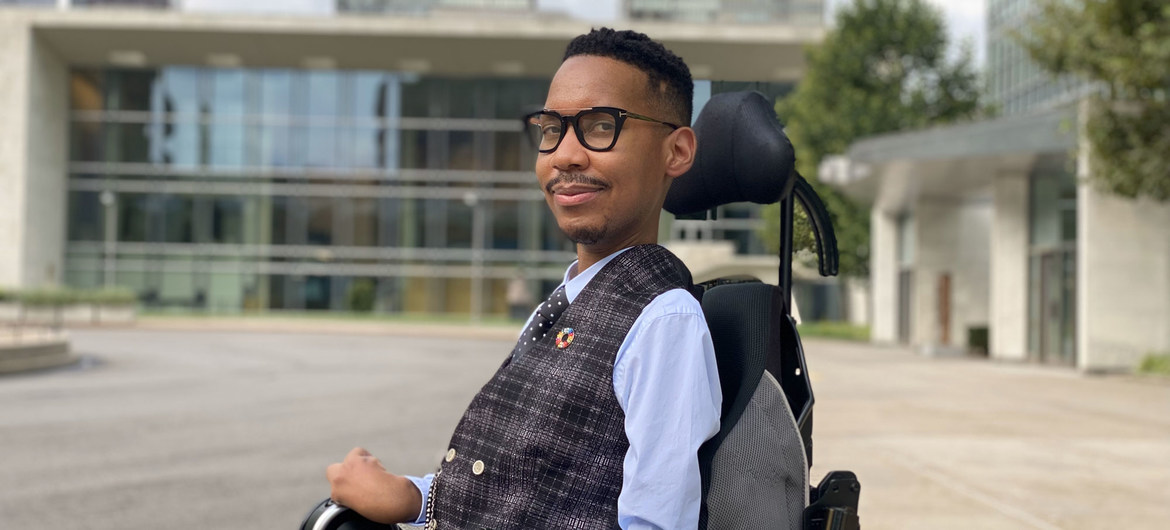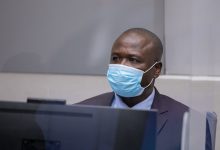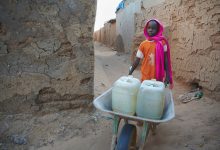First Person: ‘Disability reminds us that there is no such thing as normal’
 Eddie Ndopu, an award-winning disability activist from South Africa, and one of 17 United Nations advocates for the Sustainable Development Goals, lives with spinal muscular atrophy, and faces many difficulty daily challenges. Ahead of International Day of Persons with Disabilities, on 3 December, Mr. Ndopu discusses how he has overcome barriers to travel the world advocating for others with disabilities.
Eddie Ndopu, an award-winning disability activist from South Africa, and one of 17 United Nations advocates for the Sustainable Development Goals, lives with spinal muscular atrophy, and faces many difficulty daily challenges. Ahead of International Day of Persons with Disabilities, on 3 December, Mr. Ndopu discusses how he has overcome barriers to travel the world advocating for others with disabilities.
This feature has been edited for clarity and length. Eddie Ndopu was talking to Melissa Fleming, the United Nations Under-Secretary-General for Global Communications. You can hear the full interview on the UN podcast, Awake at Night.
“At the age of two, I was diagnosed with spinal muscular atrophy, a degenerative condition that affects the muscles and results in progressive weakness. In other words, the older I get, the weaker I become, and my doctors gave my family a prognosis that I wouldn’t live beyond the age of five. I have outlived myself by 25 years and counting.
However, I’m grappling with the physical manifestation of this rare disease and what is doing to my body: What I was able to do five years ago, I’m no longer able to do today. I had dreams of becoming an artist. I used to sketch incessantly, and now I’m no longer able to do that. But, on the other hand, my disability has really been a gift in the sense that it has allowed me to dream new dreams.
I still have my spirit. I still have my mind and I still want to be of service to humanity and the world. And so, while I move through the world, with great difficulty, I know that there is so much more that I’m able to offer.
‘The wind beneath my sails’
My mother has truly been the wind beneath my sails. I admire my mother, not just as a parent, but as a human being, who, in many ways, has sacrificed so much of her own life in order to step in and not just be a primary caregiver but really be my biggest advocate.
Because of my degenerative condition, I need to be turned at night every two hours to prevent pressure sores from forming. My mom did that for the better part of my life. Every day, seven days a week.
I need to wake up to three hours ahead of time to get dressed. I need assistance, with bathing, with clothing, with feeding, every aspect of my life that’s physical. All of that needs to be facilitated. Right now, I have a team that consists of about four people but my mum did all of that, for twenty-something years, single-handedly.
The reason why I was able to attain a mainstream education at the age of seven and become one of only a handful of disabled children in the entire country to be enrolled in a regular school, is because of my mum’s persistence, knocking on every door and being told, “This is not going to work”. She didn’t just do it as my mom. I think she did it because she believed deeply that I am deserving of a life that is truly open, and so I really owe her a debt of gratitude.
I have since gone on to graduate from Oxford with a Master’s in Public Policy and became the first African with this degenerative disability to do that. Ever. For me, that’s not just a personal achievement, it also feels like a symbolic victory for all of the disabled kids around the world who never get to see the inside of a classroom.

UN PhotoNew Sustainable Development Goals Advocate, Edward Ndopu, Founder, Global Strategies on Inclusive Education, Republic of South Africa.
‘I believe I’m a leader’
The turning point was when I was offered admission into the African Leadership Academy in Johannesburg. It’s a Preparatory School for future world leaders. I made it all the way to the finalist weekend, and they called and said, ‘we’re not sure we’re able to meet your needs’.
I wrote a letter to the founders of the Academy and I said, ‘My name is Eddie. I believe I’m a leader, I think you’ve made a mistake. I really, really need to be in the school, because I have a dream to make education accessible and inclusive for all of the children with disabilities on the continent of Africa. I want to be able to do that.’
Then, one Sunday afternoon, the phone rang. My Mum said, ‘It’s for you’ and I got the phone and they said, “we got your letter, congratulations. You’ve made it into the inaugural class.” That made me an activist and I’ve never turned back since.
I spent those two years becoming the person that I think I was meant to be, and I was exposed to the world. I started a civil rights campaign called the Global Strategy for Inclusive Education and I presented it at the World Economic Forum. I was 19 years old. I won a scholarship to attend college in Canada realized that there is no contradiction between being young and being a leader.
‘A reminder that we are not perfect’
There are 1.2 billion disabled people in the world, covering both visible and invisible disabilities. That’s about 15 per cent of the world’s total population. People don’t know this, because I think that people are afraid of disability and don’t know how to talk about it, because disabilities are still associated with neglect, isolation, and deprivation.
Disabled people are still more likely than not to be unemployed, and to not have any access to health care. Poverty is both the cause and the consequence of disability, and the overwhelming majority of people with disabilities live in poverty.
I think we don’t talk about disability because we insist on perfection. And I think disability reminds people that actually, imperfection is more intrinsic to all of us than perfection is. Disability reminds us that there is no such thing as normal, so perhaps maybe disability is the most normal.”



